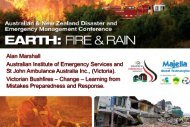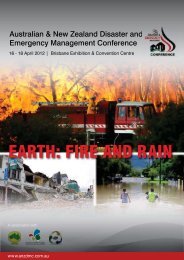Book of Abstracts 2013 - Australian and New Zealand Disaster ...
Book of Abstracts 2013 - Australian and New Zealand Disaster ...
Book of Abstracts 2013 - Australian and New Zealand Disaster ...
You also want an ePaper? Increase the reach of your titles
YUMPU automatically turns print PDFs into web optimized ePapers that Google loves.
Dr Lisa Gibbs<br />
Assoc Director, Brockh<strong>of</strong>f Child Health & Wellbeing, McCaughey Centre, University <strong>of</strong><br />
Melbourne<br />
Co Authors - Block K 1 , Snowdon E 1 , Gallagher HC 2 , Ireton G 2 , Brady K 3 , Richardson J 3 , Sinnott V 4 , Waters E 1<br />
1. Jack Brockh<strong>of</strong>f Child Health <strong>and</strong> Wellbeing Program, McCaughey VicHealth Centre for Community Wellbeing,<br />
University <strong>of</strong> Melbourne<br />
2. Psychological Sciences, University <strong>of</strong> Melbourne<br />
3. Health <strong>and</strong> Human Services Emergency Management, Victorian Department <strong>of</strong> Human Services<br />
4. <strong>Australian</strong> Red Cross<br />
5. Prevention <strong>and</strong> Population Health Branch, Victorian Department <strong>of</strong> Health<br />
Mapping shifting community recovery issues over the 4 years post bushfires<br />
The primary focus <strong>of</strong> much policy, research <strong>and</strong> practice relating to disaster relief <strong>and</strong> recovery is on the relatively<br />
short-term period post-disaster. This <strong>of</strong> course fails to recognise the <strong>of</strong>ten protracted process <strong>of</strong> physical, economic,<br />
psychological <strong>and</strong> social rebuilding. Beyond Bushfires is a 5 year research study being led by the University <strong>of</strong><br />
Melbourne that is exploring the interplay between individual <strong>and</strong> community factors <strong>and</strong> their influence on recovery<br />
from natural disaster over the medium to long term period. The study is using multiple methodologies <strong>and</strong> involves<br />
multiple partners. In building the relationships with communities to support a participatory approach we have met <strong>and</strong><br />
spoken with many individuals <strong>and</strong> community groups from bushfire-affected communities in a series <strong>of</strong> visits <strong>and</strong><br />
phone calls over the past three years.<br />
This has provided a unique opportunity to observe the changing community issues post disaster, to analyse our<br />
detailed community visit notes <strong>and</strong> map those shifting issues over time. The existing partnerships formed with<br />
<strong>Australian</strong> Red Cross <strong>and</strong> Health <strong>and</strong> Human Services Emergency Management as part <strong>of</strong> Beyond Bushfires provided a<br />
further opportunity to access community newsletters <strong>and</strong> Red Cross outreach reports collected since 2009 in the<br />
analysis. These documents also reflect the evolving <strong>and</strong> changing nature <strong>of</strong> the issues faced by communities. The<br />
resulting findings will be mapped against a timeline to provide a unique insight into both the shared <strong>and</strong> contextspecific<br />
community issues that emerged over the four years after the bushfires occurred. This has clear applications for<br />
prevention, planning <strong>and</strong> recovery service delivery for the medium to longer term post disaster.<br />
Dr Grant Gillon<br />
Senior Lecturer, AUT University<br />
Reviewing for Resilience: A fifth phase?<br />
During Hurricane Andrew (1992), Emergency Manager Kate Hale famously <strong>and</strong> publicly expressed her frustration<br />
“Where the hell is the cavalry on this one?” The US President (George H. W. Bush) subsequently dispatched the army.<br />
But, lessons identified since 1992 tell us that mostly there is no cavalry <strong>and</strong> communities recover by being resilient.<br />
One essential component <strong>of</strong> a community’s resilience is being involved in all levels <strong>and</strong> phases <strong>of</strong> an emergency <strong>and</strong> this<br />
includes any formal reviews <strong>of</strong> an event. Communities are encouraged to actively participate in all aspects <strong>of</strong><br />
emergency management but are <strong>of</strong>ten left out <strong>of</strong> a component essential for their very survival <strong>and</strong> recovery <strong>and</strong><br />
learning; the evaluation or review. The greater the degree <strong>of</strong> community connectedness, trust, underst<strong>and</strong>ing <strong>and</strong><br />
shared values, the higher the level <strong>of</strong> social capital enjoyed by that community.<br />
This social capital translates into prosperity <strong>and</strong> strengthens collaborative ties. Such characteristics are particularly<br />
useful when our emergency agencies rely so strongly on volunteer action <strong>and</strong> a prepared community develops<br />
enhanced resilience. A community’s ability to rise above adversity <strong>and</strong> respond to its own needs has been illustrated






